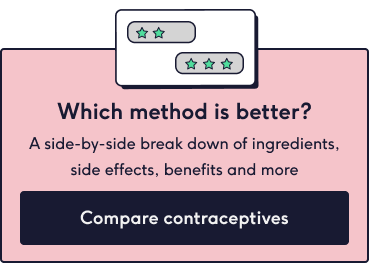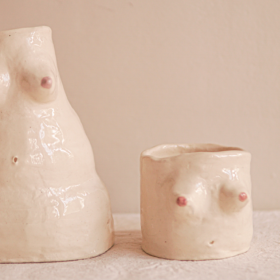
Signs and symptoms of a hormonal imbalance
In this article
What's the lowdown?
Hormones can fluctuate as part of a healthy body
A hormonal imbalance can encompass a myriad of conditions
A condition which leads to abnormal hormone levels is polycystic ovary syndrome (PCOS)
PCOS can cause irregular periods, weight gain, excessive hair growth, hair loss and difficulty conceiving
Irregular periods can be caused by puberty, menopause, early pregnancy and some contraceptives
Acne is caused by an increase in sebum – an effect of changing hormones
Starflower oil is a natural option to help ease hormonal symptoms, and can be purchased directly from The Lowdown or Amazon (our affiliate link, checked by doctors!)
Hormones play a big part in our lives: the monthly up and down of our menstrual cycles or the daily tablet-taking of the contraceptive pill. Whichever way you look at it, from those early days of puberty through to the hot flushes during menopause, our hormones are a crucial part of our lives.
So when something changes and those hormones are out of whack, how do we know and what should we look out for? More importantly, how can we settle them and get back to a happy hormonal balance? Here’s the lowdown…
What is a hormonal imbalance?
If you’ve heard the term hormonal imbalance, you might think it’s a one size fits all diagnosis. But in reality, it is a broad term encompassing a number of conditions. Hormones will naturally fluctuate depending on your menstrual cycle or if you’re going through the menopause. But there are times when the balance is just plain off and there may be an underlying issue.
What can cause a hormonal imbalance?
Polycystic ovary syndrome (PCOS)
Polycystic ovary syndrome (PCOS) affects 1 in 10 women. The cause is still a bit of a mystery, but it centres around the hormone levels in the body including androgens and insulin, which helps regulate sugar in the blood. Those with PCOS are often resistant to the effects of insulin. This leads to higher than normal levels of insulin in the blood which causes the ovaries to produce too much testosterone. This also causes imbalances in hormones throughout the menstrual cycle.
If you have two or more of the following symptoms, you can diagnose PCOS:
- irregular or no periods
- high levels of androgens – sex hormones commonly associated with men (although they are naturally produced by women, just in lower amounts)
- polycystic ovaries on ultrasound OR a high level of the AMH hormone. Despite what the name suggests, there aren’t actually cysts on your ovaries. Instead, the ovaries are enlarged, and the eggs are surrounded by follicles, which are fluid-filled sacs containing your eggs.
Those suffering with PCOS can experience weight gain, excessive hair growth, hair loss and difficulty conceiving. Irregular periods mean irregular ovulation, and tracking when you are fertile can be tricky. Those with PCOS may also find they do not ovulate at all. Check out our webinar with Professor Colin Duncan, a leading expert on PCOS, where he explains how to get a diagnosis, impact on the body and how to manage it.
Hormonal contraception
Hormones used in contraceptives can have androgenic effects. If there are high levels of androgens in the body, it can cause a hormonal imbalance. If you’re worried your contraceptive is having unwanted side effects due to androgens, check out our contraception recommender tool for help finding an alternative.
What are the symptoms of a hormonal imbalance?
Whilst symptoms you’re experiencing may point to a hormonal imbalance, it’s important to look more closely in order to find the root cause. Irregular periods, weight gain, excessive hair growth and vaginal dryness can all be signs something is up with your hormones. But which conditions could be causing your symptoms?
- Irregular periods
- Acne
- Weight gain
- Weight loss and fatigue
- Vaginal dryness
- Excessive hair
- Hair loss
- Hyperpigmentation of the skin
- Skin tags
- Muscle weakness and join aches
Irregular periods
Whilst not necessarily an indicator of a problem, irregular periods can be a sign of a hormonal imbalance. When first starting your period, it can take a few years before they fall into a regular pattern. And even then, it’s perfectly normal to have a few days variation in your cycle length.
Irregular periods can also be the first sign you are approaching the menopause. This usually starts between the ages of 45 and 55, but can start earlier. This can be due to a natural early menopause – where the ovaries stop producing hormones at the normal level – or through treatment or surgery that brings menopause on prematurely.
Other causes of irregular periods include:
- Early pregnancy
- Having a BMI over 30 or extreme weight loss or weight gain
- Excessive exercise
- Stress
- Some hormonal contraceptives
Check out our guide to the COVID-19 vaccine and periods, as it contains more information on what can commonly affect our cycles in day-to-day life. Our contraception comparison tool is also a great way to compare side effects of different methods, including their impact on periods.
As we mentioned earlier, PCOS, or polycystic ovary syndrome, can be a cause of irregular periods. Androgens, commonly thought of as male sex hormones, are found in the female body in lower levels. When there are high levels of these hormones in the body, it can give rise to symptoms associated with PCOS, such as excess hair growth and irregular periods.
Acne
Commonly associated with puberty, acne is caused by hormone changes – and puberty is a prime time. But acne isn’t exclusively linked with teenagers.
Imbalances of androgen hormones in your body can cause acne in various ways. Glands that sit next to hair follicles on the skin produce a grease-like substance called sebum. If abnormal amounts of sebum are produced, a bacterium called P. acnes causes inflammation. This bacterium usually sits quietly on the skin without causing problems. But when a hormonal imbalance is present, the sebum levels cause the bacterium to wreak havoc. This, alongside the thickening of the inner lining of the hair follicle, results in blocked pores and acne.
Weight gain
A symptom commonly seen in those with PCOS is weight gain. On the flip side, if you are overweight or obese, your body will produce higher than average levels of insulin which can help drive PCOS. You see, high levels of insulin cause your body to gain weight. Excess fat tissue, in turn, produces insulin, which makes the problem worse.
This is why it is harder to lose weight when you have PCOS, even though it is often the recommended treatment. It can be a source of great frustration for those affected.
Weight loss and fatigue
When the thyroid is overactive, high levels of hormones called triiodothyronine (known as T3) and thyroxine (known as T4) are produced and released into the blood. The increase in production of these thyroid hormones can lead to common symptoms such as weight loss and fatigue. This can be in spite of an increase in appetite. You may also experience mood swings, irritability and anxiety.
A trip to your local GP surgery can help find the cause, and treatment options can be discussed.
An underactive thyroid – hypothyroidism – can also cause tiredness. This is due to the thyroid gland under producing hormones. However, a symptom that distinguishes it from its over-producing thyroid hormone counterpart is weight gain. Other symptoms of hypothyroidism include sensitivity to cold, irregular or heavy periods, and loss of libido.

Vaginal dryness
The menopause, hormonal contraceptives and breastfeeding are just a few causes of vaginal dryness. Symptoms include sore or uncomfortable sex, pain or itching in or around the vagina, needing to wee more frequently and recurrent UTIs. Replacing oestrogen around the vagina and vulva with oestrogen cream can help. Check out our blog for more info on how hormonal contraception could be a cause of vaginal dryness.
Excessive hair
Hirsutism is the name given to excessive hair growth. Thick dark hair can be found on the face, neck, chest, tummy, lower back, bum and thighs and has a link to the levels of hormones in the body called androgens. PCOS is the most common cause of hirsutism.
Hair loss
While hormones can play a part in excessive hair growth, they can also cause hair loss. Female pattern hair loss – or FPHL – is the most common form of hair loss in women. In those with PCOS, FPHL can be due to the rise in androgen levels. There’s also a potential link between contraception and hair loss – yep, another side effect.
Hyperpigmentation of the skin
Hyperpigmentation is the term used to describe darker areas of the skin. Melasma is a type of hyperpigmentation and is thought to be caused by fluctuations in hormone levels. It more commonly affects women than men. Oestrogen and progesterone may cause the production of melanin at higher levels when skin is exposed to the sun. 10-15% of pregnant people will experience melasma as well as 10-25% of people taking oral contraceptives.
Skin tags
Often found on the neck and armpits (although they can appear in other areas of the body), skin tags are flaps of skin that can range from just a few millimetres to 5cm wide. They are made of collagen fibres and blood vessels, and they hang from the skin. They are most commonly found in obese or older people, or those with type 2 diabetes. They can also be a symptom of PCOS, as well as hormone changes during pregnancy. An interesting study looked at the link between androgen and oestrogen receptors and skin tags, in which they found a possible link between the two.
Muscle weakness and joint aches
A symptom of hypothyroidism, muscle aches and weakness can be caused by an underproduction of thyroid hormones. When coupled with fatigue, patients can experience hypothyroid myopathy. It is a common symptom affecting around 79% of people with an underachieve thyroid. The reason for this is not fully understood, but it is thought the lack of thyroxine (T4) affects the normal functioning in the cell. Fatigue and weakness can impact on normal daily activities, with an increase in severity seen following exercise or activity. However, this can all be reversible with time and treatment. Another great reason to visit your healthcare provider to discuss your symptoms!
Muscle aches and joint pains are also noted as symptoms of the menopause. And this can be caused by a lack of oestrogen affecting oestrogen receptors in the joints. Oestrogen also works to reduce inflammation, meaning a drop in the hormone increases the risk of osteoarthritis.
A drop in hormone levels during the menopause can also impact muscle strength. This time, the cause can be testosterone. Hormone replacement therapy – or HRT – can help bring these levels back within the normal range and, as a result, can help with these symptoms.
How to treat hormonal imbalance symptoms
Finding the cause of your symptoms can be crucial to finding a suitable treatment. A lesser known natural treatment option which we love at The Lowdown is starflower oil. Starflower oil is used for easing sore boobs; symptoms of premenstrual syndrome (PMS) like mood changes and cramps; as well as minimising hot flushes and anxiety during menopause. It’s an omega-6 fatty acid, and a rich source of gamma-linoleic acid (GLA) which helps reduce inflammation.
When to speak to a doctor
If you suspect you have an underlying cause for any of the symptoms we’ve talked about, it’s always worth speaking with your healthcare provider. PCOS diagnosis can involve ultrasounds and blood tests to gain a better picture of the situation, and you may also be referred to a gynaecologist or endocrinologist for treatment. Our doctors are here to help with any questions you have about a hormonal imbalance, it’s so quick and easy to book an appointment at a time that suits you – including evenings and weekends.
Our medical review process
This article has been medically reviewed for factual and up to date information by a Lowdown doctor.



